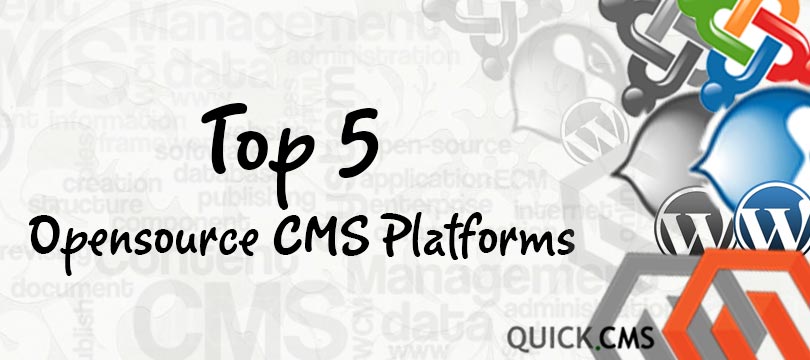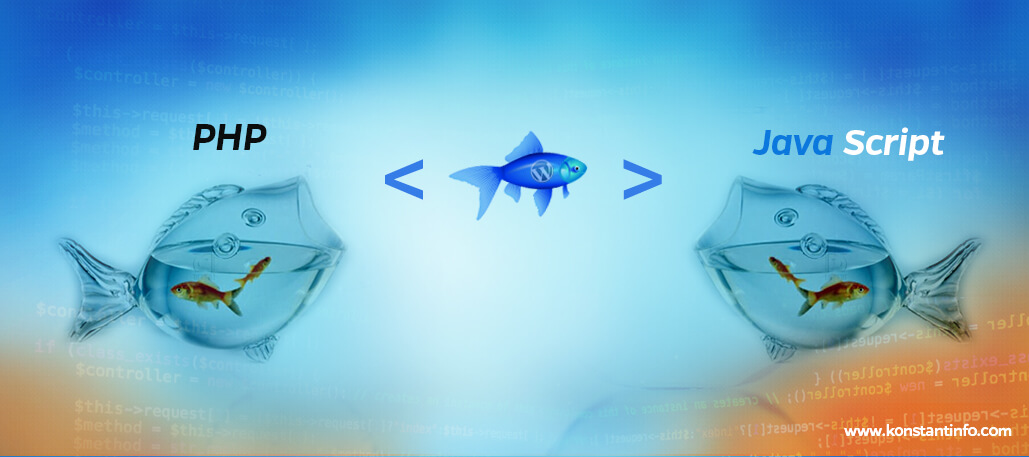
Before we get to the meat of the matter, let’s take a quick gander at what an Content Management System (CMS) is. From a layman’s point of view, CMS software allows one to keep track of, edit and manage every bit of content on a website. And by content, we’re talking about text, images, documents, multimedia, etc. Now the reason for CMS based websites is simple – they are easy to manage, maintain and update and require zero technical coding knowledge.
Now when we say opensource, we basically mean free of charge. There are a lot of Content Management Systems out there in the vast reaches of web space, but few are any good and free at the same time. There are of course a choice few that fit both criteria and that is what we have here; a list of the 5 best opensource Content Management Systems.
1. WordPress CMS
Undoubtedly the current reigning champion of opensource CMS, WordPress is responsible for powering over 74.6 million sites. Yes, that’s 74,652,825 sites and counting! The beauty of WordPress lies in its simple, easy to use and highly customizable features and functions. Additionally, since it’s an opensource piece of software, WordPress website development is not a very pricy affair. WordPress also enjoys the support of thousands of volunteers who help test and develop new versions of the software. This same community also offers multitudes of free themes and plugins that can be used to give personal touches to your site.
Like all opensource platforms, WordPress does have its disadvantages. While it is one of the easiest to use CMS out there, it can get a bit complex when it comes to graphic modifications, which require a working knowledge of HTML and CSS. Additionally, WordPress is notoriously famous for lacking on the security front and is susceptible to DDOS attacks and security leaks.
2. Drupal CMS
The Drupal CMS is a close competitor of WordPress at second position, with more features and functions than WordPress. Additionally, Drupal is famous for the high level of customization it offers, which cannot be beaten by any other opensource CMS, till date. The real-world applications of the Drupal CMS platform are practically limitless and it can be used to power everything from a small personal blog to a complex enterprise website. This high level of functionality, combined with the plethora of modules and themes available, make Drupal one of the most comprehensive CMS out there. Drupal powers such popular sites as The White House, Hilton Hotels, Amnesty International, among many others.
On the other side of the coin, Drupal does have its pitfalls, the biggest of which is its complexity. Nowadays, people require simple, easy to use CMS that can provide a high level of functionality combined with easy to use features and aesthetic value. While Drupal offers practically every function and feature in the book, it does require a good working knowledge of PHP, HTML and CSS in order to leverage maximum functionality.
3. Joomla! CMS
On the third position we have Joomla! CMS, which provides the simple, easy to use methodology of WordPress, combined with Drupal’s high level of functionality and customization. The learning curve for Joomla development lies between that of WordPress and Drupal. This makes it perfect for users who want more for their site than what WordPress offers but are intimidated by the complexity of Drupal. Some of the best features of Joomla! are that it offers easy installation, has several thousand free plug-ins that provide a greater level of functionality in small numbers and is very SEO friendly thanks to the script generating friendly links.
Joomla! is the perfect CMS only for those who wish to achieve greater customization than WordPress but are still not technically proficient enough to fiddle around with Drupal. A layman would have difficulty leveraging the maximum benefit of Joomla, while a technically proficient Joomla developer or user would simply get tired of the limited functionality offered by Joomla Additionally, Joomla! works fine only as long as you have a limited number of visitors; if this number climbs into the thousands value, it would certainly affect the server parameters.
4. Magento CMS
Magento, a fast developing eCommerce script, ranks fourth on our list of opensource CMS and is one of the best Content Management Systems for users who wish to organize their online stores in an easy and function-rich manner. Magento CMS development () is usually an option that is preferred by most online business stores as it offers high levels of innovation, scalability and performance. The beauty of Magento lies in its ability to provide site optimization based on features like Google Analytics integration, Google Base and Google Checkout that monitor customer behavior for your eCommerce store optimization. Apart from this, Magento also a very high level of customization to your themes, extensions, widgets and add-ons that allow you to personalize the store in any way you see fit.
Magento CMS is best suited for eCommerce stores and site, but relies heavily on server resources. This means investing in a good web host to ensure that the site does not suffer from slow load times or downtime due to the heavy resource usage of the Magento platform. Additionally, Magento requires a deep understanding of coding languages in order to achieve maximum customization, making it not very user friendly.
5. Quick.Cms
Quick.Cms makes the cut at the fifth spot thanks to its ease of use and efficiency. This CMS features and easy installation coupled with good SEO capabilities and most notably, conforms to most popular standards like HTML, MVC, CSS and WAI. Apart from this, Quick.Cms also features a built-in mobile version that automatically lets users decide if they want to view the page content in a way that is optimized for the mobile screen. In terms of support, Quick.Cms may not quite have the following of WordPress or Drupal, but it still has a fairly well developed community that offers good support.
While Quick.Cms is a good CMS tool for the development of simple and easy to maintain sites, it does have its drawbacks. Unlike most opensource CMS tools, Quick.Cms does not have the same abundance of plug-ins and themes that are found in other CMS tools. Additionally, modifications to its functionalities require a working knowledge of the PHP coding language.
That concludes our list of the top 5 opensource Content Management Systems; however always keep in mind that irrespective of how popular a CMS is, it may or may not be the right one for you. Every CMS has its own set of benefits and drawbacks. While choosing a CMS, it is always best to keep in mind exactly what kind of functionalities and features your site needs and then make an informed decision.
By: [googleplusauthor]



Manish Jain is the co-founder and Managing Director at Konstant Infosolutions. He is responsible for the overall operations of the company and has played a major role in bringing Konstant up from its humble beginnings and, with his immense energy and drive, transforming it into a globally trusted name in IT solutions.
Or send us an email at: [email protected]